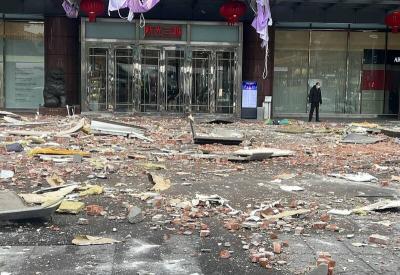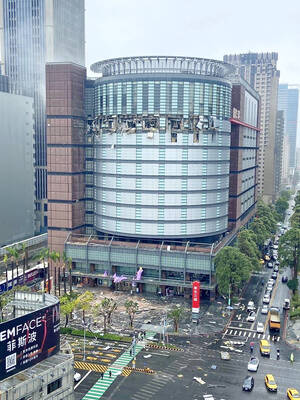Negin Farsad, a filmmaker and comedian who lives in the East Village, recalled a time not long ago when European friends would visit New York to see her, and not, she said, to use her apartment as a “temporary locker for their shopping bags.”
Farsad, 32, recently escorted two friends from London on the inevitable Europeans-clean-out-the-Apple-store shopping excursion, where they bought a MacBook Pro for nearly US$3,000, plus hundreds of dollars worth of extra memory (why not?), and continued on a spree that included East Village boutiques and Bloomingdale’s downtown. During the evenings, the couple — both of whom work in television production back home — dined at downtown restaurants and partied at a chic bars, without concern as to cost.
“I remember the next morning, my friend looked in her wallet and said, ‘Oh, apparently I spent US$165 buying three rounds of shots for everybody,’” Farsad recalled.
“Back home they’re just run-of-the-mill cubicle people,” Farsad added, “but here, they’re like three parts Kimora Simmons and two parts Oasis, circa 1995.”
This summer, New York is awash with visitors from abroad, who are expected to top last summer’s record number, tourism officials say. Thanks in part to home currencies that are holding strong against the dollar, even middle-class vacationers from Hamburg, Yokohama or Perth can afford to scoop up New York style — the clothes, the hot restaurants, the nightclubs — at bargain prices.
But for New Yorkers trapped on the other side of the currency imbalance, it’s easy to feel ambivalent about the invasion. An infusion of foreign money is welcome in a city faced with a wobbly economy and a possible budget gap in the billions. But even some locals who consider themselves cosmopolitan and internationalist confess to feeling envy, not to mention territorialism, in watching outsiders treat their city like a Wal-Mart of hip.
Their party is raging just as the hangover has started to set in for Americans. Frictions do arise — especially in a summer of looming recession, where many locals do not feel rich enough or secure enough to travel abroad themselves. (And let’s not even get into the Europeans’ weeks of summer vacation).
“It’s Psych 101 — jealousy,” said Randi Ungar, 30, an online advertising sales manager who lives on the Upper West Side. “I’m jealous that I can’t go to Italy and buy 12 Prada bags, but they can come here and buy 18 of them.”
Polly Blitzer, a former magazine beauty editor who now runs a beauty Web site, said she believes that a turf war is going on this summer between free-spending Europeans and locals over the chic bistros, spas, boutiques and department stores that she, a native New Yorker, used to consider her playground.
She said the point was driven home to her on a recent trip to Bergdorf Goodman to help her fiance’ select a pair of shoes to go with his tuxedo for their wedding.
Wearing the sort of outfit that usually acts as a siren for department store salespeople — a Tory Burch shift dress and Jimmy Choo slingback heels — she instead found herself waiting behind a European couple in sneakers and bike shorts who “had made such massive purchases that we couldn’t get anyone to give us the time of day for our size 11 and a half Ferragamo party slippers,” recalled Blitzer, 32.
The Europeans, she said, “brought over bags and bags of shoes” while the salesman wrapped their orders and chatted them up about restaurants and travel.
“I didn’t want to do the ‘ahem-I’m-sitting-here’ thing, but we had to sit there for five or 10 minutes while these big spenders small-talked,” she said.
She was always used to first-class service, she said, adding, “But now, there’s an ultra-first.”
Forecasts by NYC & Co, the city’s tourism and marketing bureau, show the number of international travelers who will visit New York this summer is expected to rise by about 118,000 up from 3.12 million last summer. That number itself was a record — and an estimated 20 percent jump from 2006.
Meanwhile, the euro has hovered near record highs against the dollar all summer; it is up 22 percent in the last two years, and since 2001, has nearly doubled against the dollar. Over the last five years, the yen is up nearly 12 percent against the dollar, the British pound 23 percent, the Swiss franc nearly 31 percent, the Danish krone 42 percent and the Australian dollar nearly 45 percent.
Feeling flush, foreign visitors are noticeably more lavish in their spending habits, said some New York merchants and restaurateurs.
City officials and business owners welcome such extravagance. Many have hailed New York’s wave of tourists as a major factor keeping the city economy afloat during a troubled economic period.

UPDATED (3:40pm): A suspected gas explosion at a shopping mall in Taichung this morning has killed four people and injured 20 others, as emergency responders continue to investigate. The explosion occurred on the 12th floor of the Shin Kong Mitsukoshi in Situn District (西屯) at 11:33am. One person was declared dead at the scene, while three people were declared deceased later after receiving emergency treatment. Another 20 people sustained major or minor injuries. The Taichung Fire Bureau said it received a report of the explosion at 11:33am and sent rescuers to respond. The cause of the explosion is still under investigation, it said. The National Fire

ACCOUNTABILITY: The incident, which occured at a Shin Kong Mitsukoshi Department Store in Taichung, was allegedly caused by a gas explosion on the 12th floor Shin Kong Group (新光集團) president Richard Wu (吳昕陽) yesterday said the company would take responsibility for an apparent gas explosion that resulted in four deaths and 26 injuries at Shin Kong Mitsukoshi Zhonggang Store in Taichung yesterday. The Taichung Fire Bureau at 11:33am yesterday received a report saying that people were injured after an explosion at the department store on Section 3 of Taiwan Boulevard in Taichung’s Situn District (西屯). It sent 56 ambulances and 136 paramedics to the site, with the people injured sent to Cheng Ching Hospital’s Chung Kang Branch, Wuri Lin Shin Hospital, Taichung Veterans General Hospital or Chung

‘TAIWAN-FRIENDLY’: The last time the Web site fact sheet removed the lines on the US not supporting Taiwanese independence was during the Biden administration in 2022 The US Department of State has removed a statement on its Web site that it does not support Taiwanese independence, among changes that the Taiwanese government praised yesterday as supporting Taiwan. The Taiwan-US relations fact sheet, produced by the department’s Bureau of East Asian and Pacific Affairs, previously stated that the US opposes “any unilateral changes to the status quo from either side; we do not support Taiwan independence; and we expect cross-strait differences to be resolved by peaceful means.” In the updated version published on Thursday, the line stating that the US does not support Taiwanese independence had been removed. The updated

‘LAWFUL USE’: The last time a US warship transited the Taiwan Strait was on Oct. 20 last year, and this week’s transit is the first of US President Donald Trump’s second term Two US military vessels transited the Taiwan Strait from Sunday through early yesterday, the Ministry of National Defense said in a statement, the first such mission since US President Donald Trump took office last month. The two vessels sailed south through the Strait, the ministry said, adding that it closely monitored nearby airspace and waters at the time and observed nothing unusual. The ministry did not name the two vessels, but the US Navy identified them as the Arleigh Burke-class guided-missile destroyer USS Ralph Johnson and the Pathfinder-class survey ship USNS Bowditch. The ships carried out a north-to-south transit from